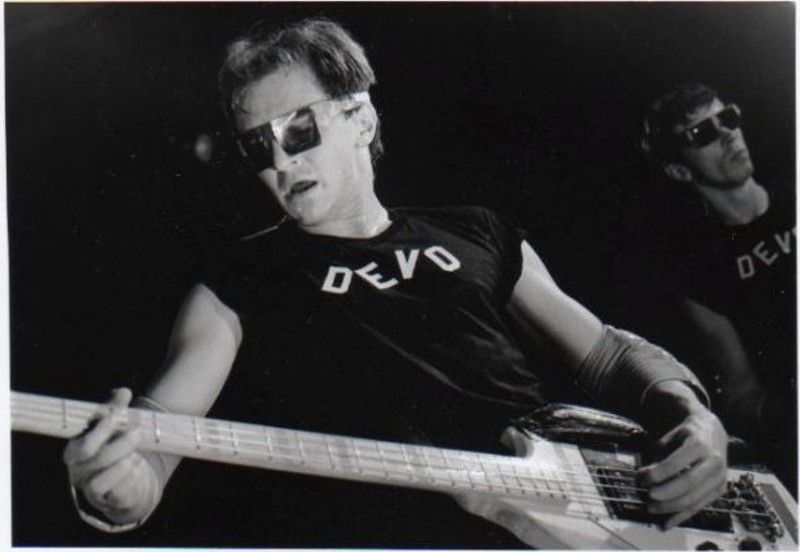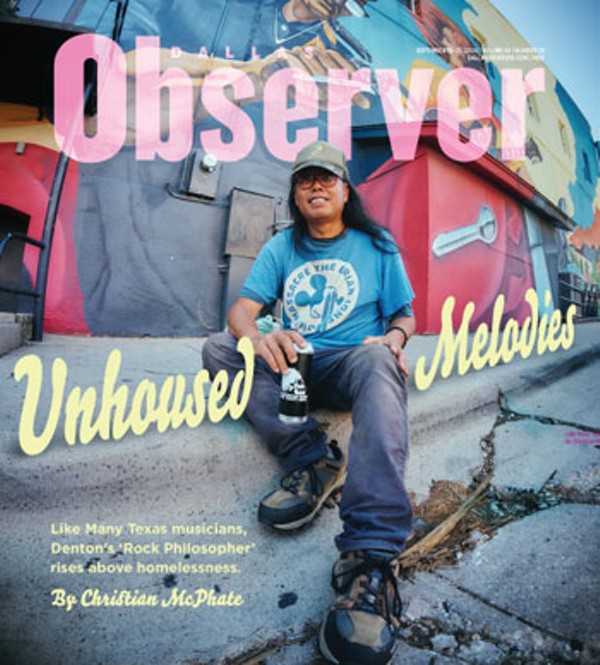Gerald Casale, the force behind Devo's creative vision, will accept the Ernie Kovacs Award September 29 at The Texas Theatre.
It might seem disconnected to honor a musician with a notable award made for television visionaries, but that's only if you don't know Devo's history and the band's ongoing philosophy of "De-Evolution."
And, as the co-founder, co-lead vocalist, bassist, and main image generator of the band (he directed most of their surrealistic videos), Casale was always the driver of Devo's darkly humorous aesthetic. Their mind-blowing (and occasionally disturbing) imagery shaped the brains of countless Gen-Xers when it landed on MTV, and even upon a rewatch, videos for "It Takes a Worried Man," "Freedom of Choice," and "Through Being Cool" (all on YouTube) still land with their caustic commentary on a materialistic society.
Casale admits that his viewpoints were shaped by Kovacs's visionary humor, whose experimental style and non-sequitur gags undoubtedly influenced his aesthetic. Surprisingly, he says Kovacs's eponymous television shows connected him with his parents.
"It's probably one of the few instances where the generation gap was merged," Casale recalls. "For some reason, my kind of traditional consumerist parents liked Ernie, and I immediately thought it was the greatest thing I'd ever seen on TV. I usually didn't watch or like anything my parents were watching. Looking back, it's Dadaistic, it's really sophisticated. It's pretending to be stupid or low, but it has all these ideas behind it. And, of course, the Nairobi Trio (Kovacs' gorilla suit skit) definitely got me started on the path to being obsessed with primates."
Casale carried the element of absurdity with him to Kent State University in Ohio, where Devo was eventually formed. He was a senior when the National Guard gunned down four fellow students in front of him during the notorious 1970 protest against the Vietnam War. The experience forever changed Casale’s viewpoint, ultimately launching his campaign against the dumbing down of society.
"I had personally been a very politically active student and took to heart exactly what Kent State meant and came out of the other side of that pretty traumatized and angry," says the musician. "America set off on this path, and everything kept going further and further to the right; people were dumber and dumber. I felt outraged, and I think so did many people making music at the time. They were driven by passionate insights. I don't care if it was the Stooges, the MC5, Devo, The Sex Pistols, or The Clash. There's a lot of similarities going on there. Obviously, we're not feigning being some anti-intellectual working-class punks. We were really punks. We had as much anger, but it was channeled differently."
One might say Devo's punk ethos was filtered through an inevitable art-school lens. Casale and co-founder Mark Mothersbaugh first bonded over culture when Casale was immersing himself in the history of visual art.
"He was taking classes there, but he wasn't a full-time student," Casale recalls of those early meetings. "I had seen things he did and thought, 'I've got to meet this guy; this guy is really strange.' I finally met him, and we really connected, but not over music. It was about art and ideas, and then I find out he plays music after the fact, and he finds out I played bass in a blues band. He thought that was dumb; I thought prog rock was annoying, so we didn't decide to make music together until knowing each other for a couple of years. I said, 'I'm trying to make de-evolutionary music,' and he said, 'I want to know what that sounds like.' We started to form a tabula rasa, where we said if it sounded like any genre, we're not going to do it."
The duo devised their own "broad canvas" of what Devo was, including the sounds, progressions, lyrics and visuals. Through the drafting of satirical rules and tenets and "endless hours" of discussion of what constituted "De-Evolution," it evolved into a band consisting of two Mothersbaughs (Mark and Bob), two Casales (Gerald and and Bob), and drummer Alan Myers, all of whom embraced a visual presentation that was kitsch and clever from the very start. Eschewing the era's ubiquitous spandex pants and platform shoes, the quartet wore fun shop masks, plastic “energy dome” hats and $3 costumes that made them resemble workers on a dystopic assembly line.
"If it was making us laugh, we'd continue," says Casale. "On the one level, we were very serious about our joke; it was not a wink-wink joke. I had been an academic student in a scholarship honors program and had been exposed to an incredible amount of art history classes and really smart professors, so I know all about Russian Constructivism, Dadaism and Surrealism, and what was going on in Europe from 1918 to 1927. The Dadaists were dressing up almost as kind of frightening costumed characters and were really oriented towards confrontation and transgression. They were pissing off their audience and challenging them to say whether what they were doing was just noise or was it music? We thought we were doing the same thing in the context of pop culture."
Early supporters such as Neil Young (really!), Iggy Pop and David Bowie were picking up what Devo was putting down, but Casale says it took years for them to develop an audience who understood what they were doing.
"We formed the band in late 1973, but nobody even saw us until 1977. At that time, there were no dance songs; there was hardcore stuff. Hardly any of it had a 2/4 beat. We were very polarizing in what we were saying. But then, 1980 comes around, and somebody starts playing 'Whip It' on the radio, and it was danceable, but that was almost like a value-added anomaly. We weren't trying to make a dance song and, yes, it helped because people could just get off on it. It was a piece of music people didn't have to think about, and maybe some people were starting to listen to what was being said."
It's hard to imagine Casale's video for the Top 40 hit (which features Mothersbaugh whipping clothing off a woman on a dude ranch) not getting censored by the thought police today, but new wavers couldn't get enough. And, indeed, "Whip It" remains a remarkably influential track, appearing in everything from Martin Scorcese's Casino to The Simpsons. Add in Casale's long career directing videos for The Cars, Rush, the Foo Fighters and Soundgarden, and it's easy to see why Bart Weiss, Dallas VideoFest artistic director and founder of the Kovacs Award, believed Casale was the ideal person to accept the honor in an election year, when the desire to return to the faux halcyon days of the 1950s has never felt stronger.
Says Weiss, "Gerald Casale and the videos he made for Devo (and others later) changed the music video form, allowing bands not just to support a record and perform a song but create an image of the band that is deeper than an LP cover. Gerald's work inspired other bands, helped make MTV culturally relevant and helped create the language of the music video."
Casale may be a founding father of that art form, but he's also a pioneer in showing what's going on behind the curtain in the era of disinformation. He feels we're headed to "total surrealism," although he's hardly nihilistic about it; he's not giving up the good fight. The truth is, Devo's theories were right all along, which will indeed be illustrated in the screening of the band's recent documentary that premiered at the Sundance Film Festival earlier this year and will screen the night before the Kovacs Award at The Texas Theatre.
Although Vice, the production company, did its best to gather imagery, it's nearly impossible to tell the story of Devo in just 90 minutes. Casale says it's a glimpse at a complicated band with a complicated story and a branding mastery that aspiring musicians would be wise to study.
"When you're trying to do the story of Devo, which is so complex and rife with layers and layers of implication and hits, it's going to be Cliffs Notes. More is left out than is put in, but that is obviously one director's understanding of being immersed in the Devo world. You could have another five documentaries, and each one would be totally different from this one, and each could contradict one another. It's like that famous Japanese movie Rashomon. Every time you understand what's going on, you understand the story completely different at the end. And which version is true? They all are."
Whoever is telling their tale, the prescience of Casale's ideas hit just as hard today as they did in the fractious time when they were first devised.
"Freedom from choice is where we're at," he muses. "It seems to be endemic to the species itself, the way that human beings work. We are a dualistic species that is our own worst enemy. We can see people exploited and downtrodden vote against their own interests. Devo was always poking at that and sarcastically making a comment on that.”
And the solution to the problem? Continue to take Devo’s message to heart, before it’s too late.
As Casale says, “It really behooves every man, woman, and child on this planet to find out we're all Devo. It's what bonds us together."
Dallas VideoFest will present the Ernie Kovacs Award to Devo’s Gerald Casale at 7:30 p.m., Sunday, Sept. 29, at The Texas Theatre. On Saturday night, September 28, at 7:30 p.m., DVF will host the screening of the new Devo documentary that premiered at the Sundance Film Festival in January.

Audio By Carbonatix
[
{
"name": "Air - MediumRectangle - Inline Content - Mobile Display Size",
"component": "18855504",
"insertPoint": "2",
"requiredCountToDisplay": "2",
"watchElement": ".fdn-content-body",
"astAdList": [
{
"adType": "rectangle",
"displayTargets": "mobile"
}
]
},{
"name": "Editor Picks",
"component": "17105533",
"insertPoint": "4",
"requiredCountToDisplay": "1",
"watchElement": ".fdn-content-body",
"astAdList": [
{
"adType": "rectangleLeft",
"displayTargets": "desktop|tablet"
},{
"adType": "rectangleRight",
"displayTargets": "desktop|tablet|mobile"
}
]
},{
"name": "Inline Links",
"component": "18349797",
"insertPoint": "8th",
"startingPoint": 8,
"requiredCountToDisplay": "7",
"maxInsertions": 25
},{
"name": "Air - MediumRectangle - Combo - Inline Content",
"component": "17105532",
"insertPoint": "8th",
"startingPoint": 8,
"requiredCountToDisplay": "7",
"maxInsertions": 25,
"watchElement": ".fdn-content-body",
"astAdList": [
{
"adType": "rectangleLeft",
"displayTargets": "desktop|tablet"
},{
"adType": "rectangleRight",
"displayTargets": "desktop|tablet|mobile"
}
]
},{
"name": "Inline Links",
"component": "18349797",
"insertPoint": "8th",
"startingPoint": 12,
"requiredCountToDisplay": "11",
"maxInsertions": 25
},{
"name": "Air - Leaderboard Tower - Combo - Inline Content",
"component": "17105535",
"insertPoint": "8th",
"startingPoint": 12,
"requiredCountToDisplay": "11",
"maxInsertions": 25,
"watchElement": ".fdn-content-body",
"astAdList": [
{
"adType": "leaderboardInlineContent",
"displayTargets": "desktop|tablet"
},{
"adType": "tower",
"displayTargets": "mobile"
}
]
}
]












